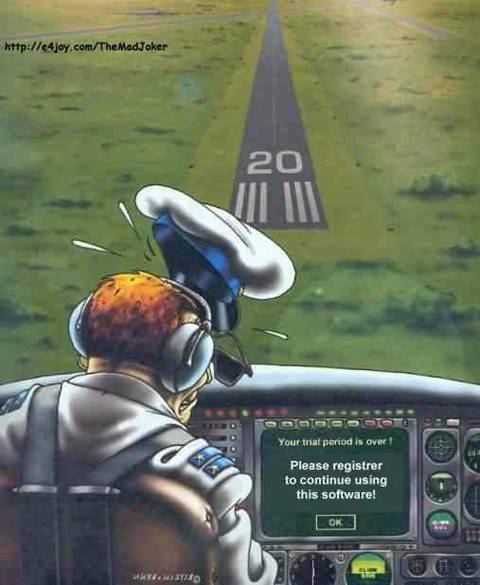 Fear of Flying
Fear of Flying
Several people have contacted me as of late about the Egyptian
airlines 767 crash. Why me? Because I used to work for Boeing, so I
have some knowlege about airplanes: how they work, what goes wrong. I
got laid off from Boeing, so I am not beholden to them, and I am still
mad at them. This would be a golden opportunity to trash Boeing's
reputation, and talk about all that doesn't work, and why, and how
Boeing management frivilously bought McDonnel Douglas instead of
focussing on the design and construction of airplanes.
I will not do that. Instead, I want to discuss the facts of the
crash, the truth about air travel, and the fear of flying.
The facts, Ma'am, just the facts
Yesterday, October 31st, an Egyptian Airlines 767 crashed into the
Atlantic ocean for reasons unknown. We know that this airplane was
built about 10 years ago, and we know that this airplane was built just
after another 767 which also crashed. 217 people died in this crash. As
of this writing, that is all we know.
Some objective truths about airplane travel:
An "objective truth" is an assertion that can be supported either by
direct observation or by inference from statistics.
You are safer on board a commercial airplane than any other
form of travel ever devised, with the exception of elevators.
This is a consequence of how air travel evolved. Travel by ship evolved
over thousands of years, and ship travel has always had risks of storm
and tide. Consequently, sailors always had a fatalistic attitude
towards their craft. Also, ship owners have been notoriously cheap,
hiring lowly people and treating them poorly. Consequently, the people
associated with ships have had a short range focus, never really seeing
the bigger picture. Consider, for example, the Exxon Valdez disaster.
The captain of the ship was drunk. This is an unthinkable occurance for
commercial flight. The culture is different.
The number of people killed flying in commercial airplanes
world wide is two orders of magnitude smaller than the number of people
killed in the United States in automobile accidents. We could
effect a serious reduction in death due to automobile accidents if we
simply shot people after their second DWI conviction. We don't do that,
because drinking and driving are still socially acceptable. Also, under
Jewish law, you can't execute somebody until they actually kill
somebody, and the Rabbis came up with all kinds of legal and procedural
dodges to avoid executing anybody. So shooting drunkards probably won't
happen. Israel has relatively few deaths due to drunk driving, but
Israeli drivers kill one another quite readily while cold sober.
There are a lot of features on modern aircraft that make
them intrisically safe. Your car has redundant brakes (that's
what a dual braking system is). Aircraft have all kinds of
redundancies, and these are just the redundancies I am aware of:
- A 747 can take off with two out of four engines out. A 737, 757,
767 and 777 can take off with one out of two engines out. A 727 can
take off with two out of three engines out at sea level, (only one
engine can fail and still take off at Denver - but it an engine fails
on take-off at Denver, the
runways are especially long so the pilot can abort the takeoff safely).
A simultaneous failure of two engines at takeoff is unheard of in the
jet age.

- The 777 flight critical systems are quadruply redundant. There
are 4 flight management computers, located in different parts of the
airplane (so a collision will not take out all of the electronics). If
the flight management computer system fails catastrophically, then the
pilot can still use the autopilot to fly. If the autopilot fails, the
pilot can still fly the airplane by hand. Incidentally, the 777 is, and
always has been, fully Y2K compliant.

-
The 747 has 4 main landing gear struts. The 777 has 6 wheels on each
main landing gear and has redundant structural elements controlling the
main gear. The 767 landing gear is also used on the B-2 bomber, the
Most Expensive Airplane In the world. If it's good enough for the USAF,
it's good enough for the rest of us.
- The 747 has a quadruple redundant hydraulics. The DC-10 has
triple redundant hydraulics. Why 4 instead of 3? It was a design
decision back in the late sixties. But.... one day, a
747 took off from San Francisco airport and struck a light tower at the
end of the runway. That took out three of the four hydraulic systems.
The pilot was able to fly the airplane over the pacific, dump fuel, and
return to the airport safely. This is not to disparage the DC-10, which
is a fine airplane. But the 747 is better.
The new airplanes have only two engines. But they also have a
little gizmo called a Ram Air Turbine, or RAT. If the airplane should
lose both engines in flight, the RAT will pop out of the belly of the
airplane and power the electronics and hydraulics long enough for the
pilot to make a dead-stick landing. This was tested once by an Air
Canada 767. The guy loading the fuel in the airplane thought he was
loading kilograms of fuel when in fact he was loading pounds of fuel.
So the airplane took off with half as much gas in the tanks as they
thought. Halfway across Canada, it ran out of fuel. The pilot did a
deadstick landing on an abandoned race track. Everybody walked away
from that - the airplane was repaired, refueled, and returned to
service.
- The 777 has multiply redundant navigation systems. It has a
strapdown inertial navigation system, which can measure acceleration
and rotation yet it has no moving parts (it's done with mirrors,
literally), so it can navigate without any outside reference. It also
has a Global Positioning System receiver so it can navigate via
satellite. It has the usual compliment of Automatic Direction Finders
(ADF), Visual Omnidirection Range (VOR), and glide slope receivers, so
it can navigate via radio. And finally, the pilot can always get on the
radio and ask "where the hell am I?", although I understand they are
reluctant to do that....
There are other factors that make airplane travel intrinisically safe:
To avoid a collision, an airplane can go left or right, or speed up
or slow down, or go up or down. By way of contrast,
cars, can only go left or right, or speed up or
slow down. Ships are even worse.
The maintenance of airplanes is more intense than maintenance of
cars or trains or ships. The FAA may be accused of indifference,
indecision, and politicization, and reasonable people may disagree
about this, but the truth is that, for all its faults, the FAA is far
more maniacal about maintenance than the Federal Rail Administration
(FRA) or the US Coast Gaurd. We won't even mention trucks.
Training for air crews is far more intense than the training for
drivers or locomotive engineers or ship captains.
The intrinsic economy of air travel (you fly a nice, straight line,
there is no ground friction and little wind resistance) coupled with
the remarkably expensive equipment required to do it means that the
airlines have a vested economic interest in keeping you safe.
A ship, a car, or a train can't get above the weather (yes, trains
are affected by weather, too). An airplane can. Airplanes move fast
enough to get around bad weather.
But these are the words of an engineer, and they aren't convincing.
At least, I have never convinced anybody. Why? Because you can't combat
emotions with logic. So let us consider the emotion of fear of flying.
Why people are afraid of flying
People smoke cigarrettes. They ride bicycles without helmets. They
drink and drive (and kill far more people than airplanes do). The climb
mountains. They have extramarital affairs (and endanger themselves and
their spouses). They buy Sport Utility Vehicles and endanger everybody
around them with their noxious exhaust and their gross vehicle weights.
So people willingly engage in risky activity and it doesn't faze them.
What is different about airplane travel?
- When airplanes do crash, it kills many people. And it is unusual.
So it gets a lot of media attention. By way of contrast, death due to
drunk driving and bicycle accidents are common and kill one or two
people at a time, so it gets little media attention.
- Airplanes have a lot of mysterious high technology associated
with them. What holds an airplane up? Betcha don't know! (And, if you
give me the textbook answer from high school, my next question will be
how does an airplane fly upside down!). Worse, the people who
fly speak a strange language - what we call I-79 they call
"india-seven-niner". They talk about RAT, and FMS, and VORTACs and
strap down inertial navigators. There are all these strange noises,
from the bing-bong! sound of the flight attendent call button
to the thump! that the landing gear doors make when the
landing gear retract.
- Airplanes represent a tremendous surrender of control. We strap
ourselves into this aluminum cylinder (aluminum - so soft, it is so
easy to crush an aluminum can -what the hell are we doing flying across
the north pole in something made out of aluminum?), and these
disembodied voices fly us to wherever we are going. If we decide in the
middle of the ocean that we don't want to do this any more, then there
is nothing we can do. We can't even bail out if the movie is bad!
- Airplanes are uncomfortable. Let's face it: it is boring to fly
(except when something goes wrong, and then it's terrifying).
The seats are uncomfortably thin, and they don't recline far enought to
really allow sleeping. The air is dry (you don't notice that, but it's
true). The light is bad, the food is awful, and the people around you
are typically
stressed.
- Humans evolved on the ground. But even birds are afraid of
heights. There are some birds that live around the Grand Canyon in
Arizona. They are capable of flying across the canyon, but they don't.
Instead, they fly down and then fly up again.
In fact, it is natural to fear flying. The solution to the problem
is not to deny the fear, but to acknowlege it, experience it, savor the
fear and then be brave and do the thing you are afraid of. Fear is
important - it protects us from our own stupidity. But while we should
allow fear to guide us, we should not allow fear to control us. Because
while Fear protects us, Fear also leads to the evils of indifference,
racism, and paralysis.
Conclusion:
I do not think of myself as a reckless man. I am married with
children, and I have a good job and a bright future. I ride a bike,
true, but I am fanatical about wearing a helmet, gloves, and thick,
bright colored clothing. I have lights front and rear, and I carry
redundant batteries and a spare light bulb. I have mastered the art of
bicycle repair, but I still take the bike in once a year
for a stem-to-deraileur checkup by real professions. I even carry a
modest first aid kit. So while I am engaged in a risky activity, I am
still careful.
I am planning on flying to Israel in the spring with my Rabbi,
Jonathan Singer. Rabbi Singer is a brilliant man, a good friend, and
also a husband and a father. His wife, Rabbi Beth Singer, is a
brilliant woman, is also my friend, and a wife and a mother - could I
possibly leave her a widow? Far be it from me to do such a thing! I
would not dream of advocating any course of action that would put
either of us at risk. So this is no academic discussion. I am putting
my life on the line for a system of belief. If I am right, I am going
to have a good time, and learn a great deal.
Travel to far off places promotes prosperity, and prosperity
promotes peace. We Jews are commanded over and over again to pursue
peace. Our history is full of examples of Jewish heroes who have taken
grave risks to promote peace. Yitzhak Rabin, of blessed memory, is only
the most recent example. Therefore, I think we should be brave, and go.
Notes:
There are some things you can do prior to flying which will reduce your
anxiety.
- Wise travelers bring water on board the airplane with them,
either in a resealable pop bottle or in a strong plastic container
(paper containers tend to burst). The air at altitude is very dry and
tends to dehydrate you. Also, the act of getting up out of the chair
and going to the bathroom helps promote circulation in the lower legs
and prevents pooling of blood.
- There is absolutely no reason to drink alcoholic beverages in
flight. So don't do it. Using illegal drugs, tranquilizers, or
amphitimines is lunacy.
- Allow plenty of time to get the airport. The monotony of waiting
pales in comparison to the stress of missing a flight.
- Take the time to familiarize yourself with your airplane. If you
are really and truly afraid to fly, go find a sympathetic pilot (not
any pilot will do-it's got to be a sympathetic one) and have him or her
show you around the airplane. A lot of the fear comes from the fact
that things are so mysterious. Knowlege dispells mystery.
- In the same token, use the Internet to find maps of the airports,
and study them before you leave.
- Get in shape. This is good advice for a number of reasons:
- When we arrive at our destination, we will have to do some
walking.
- Jerusalem is fairly high, and the air is relatively thin. It
is not as bad as Denver, but if you aren't in shape, then it might make
you uncomfortable
- It will tend to be hot. Your body responds to heat by
expending energy pumping blood from your body's core to the
extremities, where it cools and returns to the core. This mechanism
presents an additional load on your heart and lungs. If you are in
shape, then your body will handle this process easily.
- If you are in shape, then your blood will return to your
heart from your feet, even if you sitting for a long time
- If an emergency does occur, then conditioning might make a
difference between survival and perishing. For example, if the airplane
has to make an emergency landing, and catches on fire, you might be
able to outrun the flames. If the airplane loses cabin pressure, if you
are in shape, you might be able to stay conscious until the airplane
gets to lower altitude
We have 5 months before we leave. Anything you can do to help build up
your endurance will help.
- Remember, we are in this together. One of the things that
contribute to our feelings of fear is the idea that we are all alone.
We're not all alone, we're a team and we are all together.
Return to the home
page.







Windows
sucks, Linux rocks!
see new web server .web server .web server .
 Fear of Flying
Fear of Flying Fear of Flying
Fear of Flying
